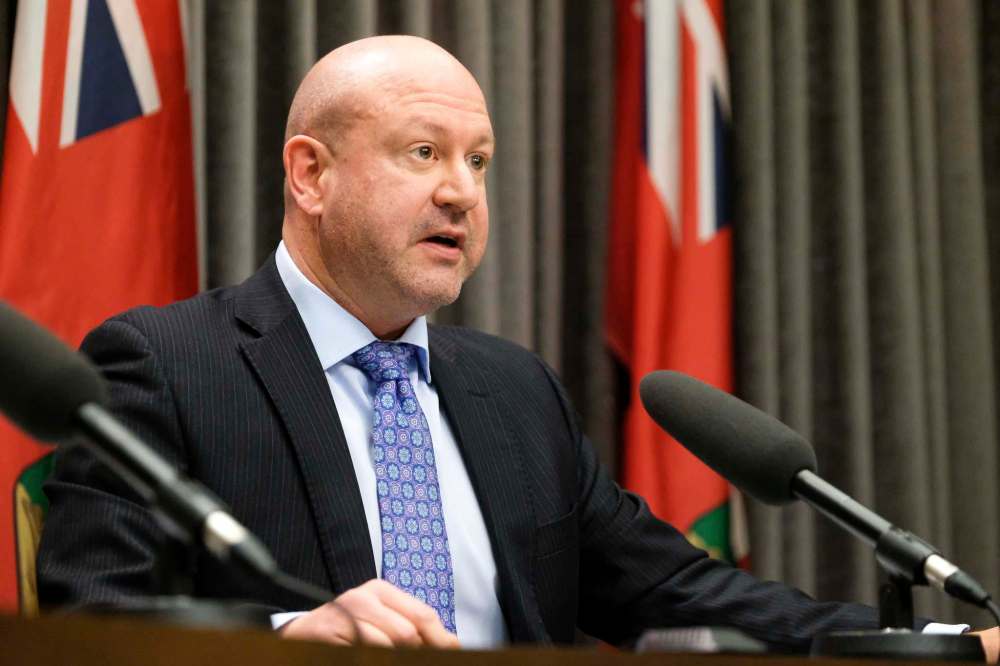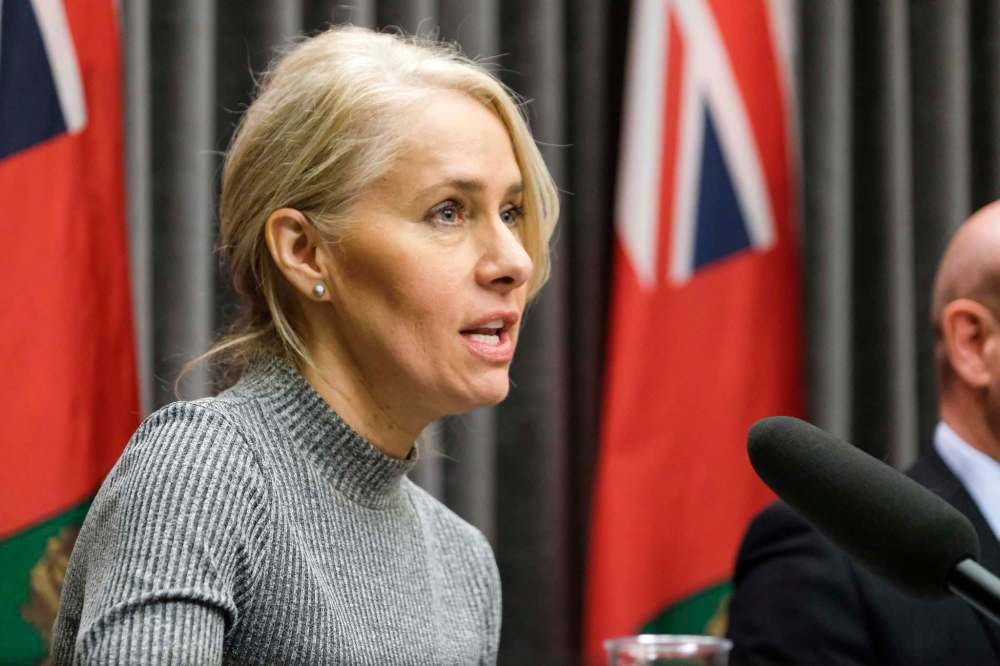City facilities closing as Manitoba’s health system preps for more COVID-19 tests
Advertisement
Read this article for free:
or
Already have an account? Log in here »
To continue reading, please subscribe:
Monthly Digital Subscription
$0 for the first 4 weeks*
- Enjoy unlimited reading on winnipegfreepress.com
- Read the E-Edition, our digital replica newspaper
- Access News Break, our award-winning app
- Play interactive puzzles
*No charge for 4 weeks then price increases to the regular rate of $19.00 plus GST every four weeks. Offer available to new and qualified returning subscribers only. Cancel any time.
Monthly Digital Subscription
$4.75/week*
- Enjoy unlimited reading on winnipegfreepress.com
- Read the E-Edition, our digital replica newspaper
- Access News Break, our award-winning app
- Play interactive puzzles
*Billed as $19 plus GST every four weeks. Cancel any time.
To continue reading, please subscribe:
Add Free Press access to your Brandon Sun subscription for only an additional
$1 for the first 4 weeks*
*Your next subscription payment will increase by $1.00 and you will be charged $16.99 plus GST for four weeks. After four weeks, your payment will increase to $23.99 plus GST every four weeks.
Read unlimited articles for free today:
or
Already have an account? Log in here »
Hey there, time traveller!
This article was published 14/03/2020 (2104 days ago), so information in it may no longer be current.
Recreation centres, pools and libraries will not open to the public Monday and will remain closed as the city aims to slow the transmission of the novel coronavirus.
City of Winnipeg emergency operations centre manager Jason Shaw said Saturday between 200 and 300 city staff will be impacted by the closures and will continue to be paid while the facilities are closed.
“Our number one priority is the wellness and safety of our staff and our citizens,” Shaw said.

City employees may be asked to continue to work if duties can be carried out productively while facilities are closed to the public, or they could be redeployed elsewhere within the organization when possible, according to city officials. Only city-owned and operated facilities are currently affected. The city operates 19 public libraries, nine leisure centres and a dozen pools.
“We’re going to take care of our staff,” Shaw said. “The city of Winnipeg made those decisions very early on in terms of what our priorities were, and we’re standing behind our staff and it’s important, so we’re going to take care of them.”
Shaw said the facilities will be closed to the public until further notice, and Leisure Guide programming will also be cancelled effective March 16. The 2020 Spring-Summer Leisure Guide registration scheduled for March 17 has also been postponed.
Bus cleaning ramped up
Winnipeg Transit has also enhanced its cleaning efforts in response to the COVID-19 pandemic, and added a new sanitizing protocol targeting “high touch points” for bus interiors Saturday. Approximately 170,000 people use Winnipeg Transit daily.
The bolstered cleaning protocol was being considered by city officials prior to its implementation Saturday, and the city’s response is in keeping with other jurisdictions, Shaw said.
“This is a day-to-day, hour-to-hour changing environment,” he said, “When we talk to and reach out with other transit services across Canada, we’re trying to maintain best practices and new information is coming at the hour and daily.”
Winnipeg Transit is using ES65H disinfectant, which is the industry standard and highly effective, Shaw noted, and the same hospital grade disinfectant used by the Toronto Transit Commission. He couldn’t say how much of the chemical Winnipeg Transit currently had in stock or how long its supply would last.
“We’re taking proactive steps right now to make sure that we’re in line and we’re flattening that curve. That’s the message right now.”
Shaw said transit officials are currently devising a schedule to make sure “all buses are cleaned effectively and efficiently,” and is in the process of acquiring additional equipment needed to apply the chemical. He could not say how often buses would be sanitized but that information would be forthcoming.
Amalgamated Transit Union Local 1505, which represents Winnipeg Transit bus operators, criticized Winnipeg Transit Friday for not immediately enhancing its cleaning procedures in response to the arrival of COVID-19 in the province.
ATU 1505 president Romeo Ignacio said the union continues to push Transit to allow members to wear face masks and gloves.
“Unfortunately, Transit has not given a clear direction on this question which is concerning to ATU members as any masks or gloves would technically be a violation of Transit’s uniform policy and could potentially subject our members to discipline,” Ignacio said in a statement. “Furthermore, Transit has informed ATU that they do not have enough gloves or masks to provide to the frontline members providing basic transportation services.”
Shaw said face masks are recommended for individuals who are symptomatic and Transit is working with operators to allow masks, if desired.
“Right now masks are for people who are sick, for first responders and frontline health workers,” he said. “If you’re sick, you should stay home.”
Chief provincial public health officer Dr. Brent Roussin said the risk of contracting COVID-19 remains relatively low and the province has not seen evidence of community-based transmission.
There are now four lab-confirmed cases of COVID-19 in Manitoba, Roussin said. All appear to be travel related.
Only those with symptoms should get tested: chief medical health officer
Roussin also reiterated the need for continued social distancing. He emphasized people should only be tested for the virus if they have a fever, cough, and symptoms of respiratory illness, and have also travelled internationally in the past 14 days. Those who’ve been in contact with people who have confirmed cases of the virus should also be tested.
“There is no need for people who are not showing symptoms to be tested,” Roussin said. “We’re seeing increasing demand on our health-care institutions, as well as the increased demand at the lab, and so we are asking that only appropriate samples be sent.”
On Friday, the province announced classes would be suspended for students in kindergarten to Grade 12 for three weeks, beginning March 23 and ending April 10.

“The risk in schools is currently low. What we’re doing is out of an abundance of precaution and giving that buffer week allows various parents, organizations to plan for the upcoming closure,” Roussin said.
Roussin said the province is weighing whether it will recommend the closure of daycares and more information will be provided in the days to come.
Officials with Manitoba’s health authority also urged the public to have patience as screening and testing for potential COVID-19 cases continue.
The Cadham Provincial Laboratory is testing more than 500 swabs per day and has completed roughly 1,200 tests so far, Roussin said. It’s difficult to estimate how many tests are outstanding, he said.
Lanette Siragusa, chief nursing officer and health system integration lead with Shared Health, said more than 600 people have presented for COVID-19 testing over the past two days at the four community screening locations set up by the province.
“Planning continues to further expand dedicated screening locations including rural and northern Manitoba in the days ahead. This should balance out an anticipated rise in the number of healthcare workers self-isolating or having child care issues related to the coming closure of public schools,” Siragusa said. “We anticipate this could free up a number of nurses to be redirected elsewhere and open up beds for COVID-19 patients.”
The province has also added an additional community screening centre to test for influenza and COVID-19 in the William Avenue mall at Health Sciences Centre.
As of Sunday, access to the HSC campus will be restricted to allow screening of visitors to the health-care facility, Siragusa said.
“These restrictions will ensure screening of visitors arriving at the facility can occur,” Siragusa said. “We ask that anyone who has upcoming appointments at the Health Sciences Centre campus take these new restrictions into account when planning their day.”
Hundreds of daily calls coming in to provincial health phone line
The current wait time to connect with an operator on Health Links-Info-Sante is a little more than an hour, Siragusa said, and improvements continue to be made to the system. As of Friday, Health Links now has the capacity to handle more than 100 callers simultaneously. The system is receiving between 700 and 1,000 calls per day.
“We hope that in the coming week that we will also be able to offer a virtual solution so that people can online triage themselves,” she said.
For people self-isolating and waiting to hear back about their test results, Roussin said the province is putting new measures in place to speed up the process of reporting negative results.
“You can be assured that these positive results are managed immediately,” he said. “The sheer numbers of these tests are leaving us with a lot of negative results which normally as you see your doc, you don’t get called about.
“We understand people self-isolating, waiting for these. We want the negative results called out but there’s such a large number of them, and we’re focused on positives right now,” he said.
“Although we know that there’s the convenience factor with waiting for these negative results and we certainly acknowledge that, we’re leaping all over these positive results right now.”
danielle.dasilva@freepress.mb.ca

Our newsroom depends on a growing audience of readers to power our journalism. If you are not a paid reader, please consider becoming a subscriber.
Our newsroom depends on its audience of readers to power our journalism. Thank you for your support.
History
Updated on Saturday, March 14, 2020 5:19 PM CDT: Update: Adds sidebar




